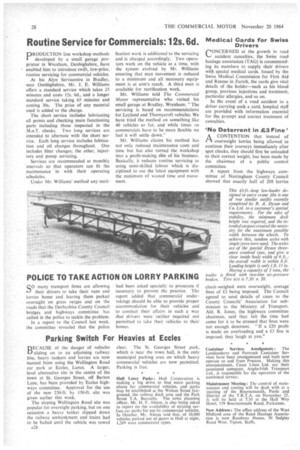Routine Service for Commercials* 12s. 6d.
Page 30

If you've noticed an error in this article please click here to report it so we can fix it.
PRODUCTION line workshop methods developed by a small garage proprietor in Wrexham, Denbighshire, have enabled him to introduce swift, low-price, routine servicing for commercial vehicles.
At his Alyn Servicentre in Bradley, near Denbighshire, Mr. J. E. Williams offers a standard service which takes 25 minutes and costs I2s. 64., and a longer standard service taking 65 minutes and costing 30s. The price of any material used is added to the charge.
The short service includes lubricating all points and checking main functioning parts including those inspected in the M.o.T. checks. Two long services are intended to alternate with the short service. Each long service includes lubrication and oil changes throughout. One includes filter changes; the other, injecttors and pump servicing.
Services are recommended at monthly intervals so that operators can fit the maintenance in with their operating schedules.
Under Mr. Williams' method any recti
fication work is additional to the servicing and is charged accordingly. Two operators work on the vehicle at a time, with the system evolved by Mr. Williams ensuring that man movement is reduced to a minimum and all necessary equipment is at arm's reach. A third man is available for rectification work.
Mr. Williams told The Commercial Motor representative who visited his small garage at Bradley, Wrexham; "The servicing is based on recommendations for Leyland and Thornycroft vehicles. We have tried the method on something like 40 vehicles so far, and while times on commercials have to be more flexible we feel it will settle down."
Mr. Williams claims his method has not only reduced maintenance costs and time but has also turned the workshop into a profit-making side of his business. Basically, it reduces routine servicing to using semi-skilled labour which is disciplined to use the latest equipment with the minimum tif wasted time and movement.




















































































































